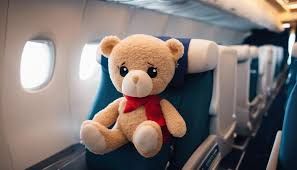The yowling started shortly after I folded myself into seat 6C on the Southwest flight from Washington, D.C., to Chicago. It was coming from 6D or, specifically, under 6D, where emotional support animals congregate.
“She’s mad at me,” said the woman occupying 7D, gesturing to the flowered bag nestled on the floor between her and the forward seat. “I gave her a ball of yarn, but she wants out.”
The conversation didn’t include me; it was directed at a fellow cat lover, sitting directly behind me. Together, the two swapped stories of taking their beloved kitties on flights to Lord only knows where.
“She’s NEVER been away from me,” the woman said, as the meowing increased, loud enough to pierce a jet engine’s hum. “But next week I’m going to a bachelorette party and there’s NO WAY I can bring her.”
Please Tell me EVERYTHING About Your Emotional Support Cat
In the next few minutes, I learned the cat was a hypoallergenic Russian Blue breed; she was not a rescue; her first flight was to New Orleans where the woman’s parents lived; she was still full of “kitty energy” despite her advancing age (the cat, not the owner) and cat toys interested her for five minutes tops, even those crocheted by her “mom.” as the owner referred to herself.
Glancing over, I noticed the rambunctious, yet still unseen feline also occupied the woman’s iPhone screensaver.
I have grown accustomed to airline passengers who insist on plane travel with their animals, whether it’s for emotional support purposes, they’re too cheap to pay for boarding, or they don’t trust friends or relatives to tend to their animals’ every need via daily visits.
While doing research for what may be an upcoming book on “gig work,” I briefly drove for Uber. One fare consisted of a couple on their way to Los Angeles with their two dogs. I didn’t recognize the breeds, but one pooch was significantly larger than its travel companion and commanded most of the owners’ attention as we crawled to O’Hare. The couple was convinced the larger dog could potentially be trouble. Both dogs, I learned, were given ample amounts of medication prior to my arrival, in hope they would sleep the entire flight.
Later that day I texted the husband, half-jokingly inquiring if the dogs caused them to lose their frequent flier status.
“We got written up,” he texted back. “Because of the little dog.”
Like I said, I find these stories amusing. Pet lovers, travel with your live creatures at your own risk. I’m fine with that.
It’s the fake ones I can do without.
Here Comes (Literally) Stuffy
I’ve lost count of the number of passengers I’ve seen trudging down airplane aisles with stuffed animals. Their owners are typically female, late teens to early 20s, and clad in workout pants and bulky sweatshirts bearing the name of either a university or a sporting event. During the flights, they cradle their cotton, hug it tight, or, worse, shove it in overhead bins reserved for other items. Like actual BAGS!
Thankfully, it appears the FAA has taken notice.
While stuffed animals are not illegal, larger ones now qualify as “luggage,” a rule the Southwest gate agent confirmed over the loudspeaker as we lined up to board. In typical Southwest fashion, it was done in a humorous manner; but the message was clear: If you want to caress your fake animal in flight, plan to keep doing so while awaiting the bag you could have brought aboard but now have to check.
Hear that, Gen Z sorority sisters? You may want to look into train travel.
I didn’t know how many stuffed animals were aboard my flight but, considering college spring break was in full swing, I guessed at least a dozen. Luckily, I found overhead space for my suitcase, allowing me to contemplate whether the cat owner next to me will actually be able to survive her upcoming bachelorette party without her beloved companion.
Maybe there’s a Russian Blue stuffed kitty that will soothe her in flight.
Let’s hope the bag she had to check doesn’t go missing.




The F-Bomb Has Gone Mainstream — And Nobody Cares Anymore